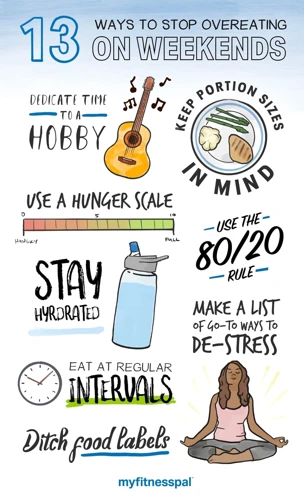It’s no secret that stress can take a toll on our overall health and wellbeing. One of the most common symptoms of stress is the urge to snack, even when we’re not necessarily hungry. This phenomenon, known as stress-induced snacking, can lead to overeating and weight gain if left unchecked. But how do we break this cycle and create a healthier relationship with food? The answer lies in implementing a self-care routine that prioritizes stress reduction and healthy habits. In this article, we’ll explore the concept of stress-induced snacking, the importance of self-care for managing stress, and practical tips for creating your own self-care routine to avoid stress-induced snacking.
Understanding Stress-Induced Snacking
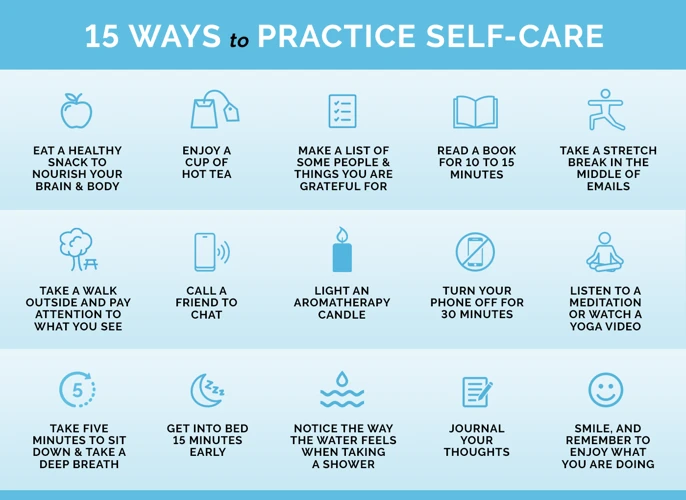
Many people find themselves mindlessly munching on unhealthy snacks during times of stress. This can lead to unwanted weight gain and a cycle of unhealthy eating habits. But what causes us to turn to snacking during stressful situations? And how can we distinguish between true hunger and stress-induced cravings? In this section, we will dive deeper into the phenomenon of stress-induced snacking and explore the reasons behind it.
What is stress-induced snacking?
Stress-induced snacking is an unhealthy habit that involves consuming food as a means of coping with stress or emotional discomfort. This type of snacking typically involves consuming high-calorie and high-fat foods, as these types of foods are often associated with comfort and pleasure. Stress-induced snacking can occur in response to a range of emotional stimuli, including frustration, anxiety, boredom, and sadness. These emotional triggers can cause individuals to reach for food as a way to soothe their emotional pain, setting up a vicious cycle of cravings and unhealthy eating patterns.
Stress-induced snacking can be problematic for a number of reasons. First and foremost, it can lead to promoting unhealthy weight gain and disrupting a healthy diet. Secondly, it can negatively impact your mental health, as overeating can lead to feelings of guilt and shame that further exacerbate stress and emotional discomfort. Finally, it can lead to a feedback loop, where snacking itself becomes a trigger for more stress and more snacking, perpetuating the cycle.
There are several physical and psychological signs that you may be engaging in stress-induced snacking, including irregular eating patterns, feelings of anxiety or depression, low energy levels, and fluctuating weight. By understanding the causes and consequences of stress-induced snacking, you can begin to take steps to combat this harmful habit and build a healthier relationship with food.
Why do we stress-eat?
Stress-eating is a common response to emotional tension, but why do we turn to food as a source of comfort? There are several reasons for this behavior, including:
| Reason | Description |
| Impact of cortisol | Cortisol, a hormone released in response to stress, can increase our appetite and make us crave high-calorie, high-carbohydrate foods. |
| Seeking distraction | When we feel stressed or anxious, we often seek a distraction to take our mind off of the source of our stress. Eating can provide a temporary distraction from our worries. |
| Emotional regulation | Food can serve as a source of emotional comfort or reassurance. When we eat, we may experience a brief moment of pleasure or satisfaction that can help regulate our emotions. |
| Social conditioning | Many of us have been taught to associate food with comfort and celebration from a young age. This conditioning can lead us to turn to food as a source of comfort during times of stress or sadness. |
Understanding why we stress-eat can help us address the root causes of this behavior and develop healthier coping mechanisms.
The difference between stress-eating and hunger
The difference between stress-eating and hunger
| Characteristic | Stress-eating | Hunger |
| —————————— | —————————— | ———————– |
| Trigger | Emotional state | Physical need |
| Craving type | Unspecific, usually sweet | Specific, craving certain foods |
| Urgency | Immediate and intense | Gradual and controllable |
| Fullness level | Usually not satisfied by food consumed | Satisfied by food consumed |
| Feeling afterwards | Guilt or shame | Contentment |
When we eat in response to stress, we are usually not responding to physical hunger but rather to an emotional state. Stress-eating can lead to consuming large amounts of food quickly and not feeling satisfied after, leading to feelings of guilt or shame afterwards. In contrast, physical hunger is a biological need for nutrients, and we typically have a specific craving for certain foods. The urge to eat due to physical hunger is usually gradual and controllable, while stress-eating tends to be immediate and intense. Additionally, when we eat in response to physical hunger, we usually feel full and content afterwards.
The Importance of Self-Care for Managing Stress
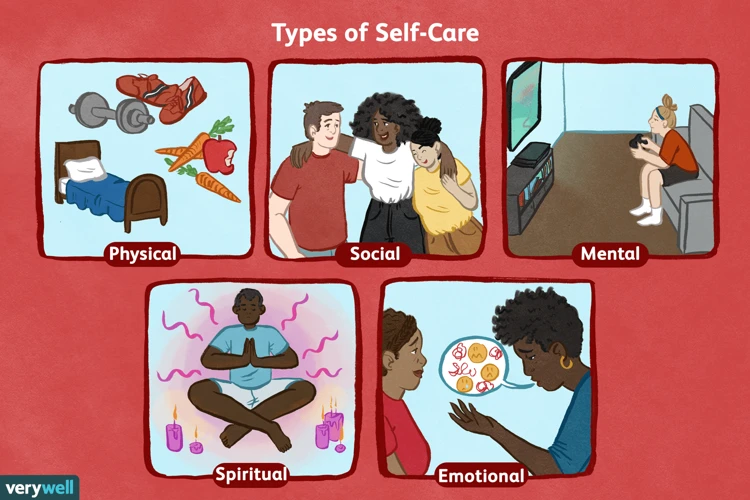
As we navigate through our daily lives, stress is an inevitable obstacle that we all encounter. It can easily take a toll on our mental and physical wellbeing, and often leads to unhealthy habits such as overeating or snacking on junk food. This is where the importance of self-care comes into play. By prioritizing self-care, we can effectively manage our stress levels and make healthier choices when it comes to food consumption. In this section, we will delve into the significance of self-care, its impact on stress levels and healthy eating habits, as well as its connection to weight loss.
What is self-care?
Self-care is the practice of intentionally taking care of one’s physical, emotional, and mental well-being. It involves identifying one’s needs and taking responsibility for meeting them. Some examples of self-care activities include:
- Physical self-care: Engaging in regular exercise, getting enough sleep, and eating a healthy diet.
- Emotional self-care: Practicing mindfulness, engaging in creative activities, and cultivating positive relationships.
- Mental self-care: Engaging in learning and personal development, engaging in hobbies and interests, and seeking support from a therapist or counselor.
Self-care involves recognizing the importance of taking care of oneself in order to live a healthy and fulfilling life. It is important for managing stress levels and avoiding stress-induced snacking. By prioritizing self-care, individuals can improve their overall well-being and maintain healthy eating habits.
The impact of self-care on stress levels and healthy eating habits
Taking care of ourselves is not just about pampering ourselves with spa days and luxurious baths; it goes beyond that. Self-care is the act of making sure that our physical and mental health is being taken care of. When we prioritize self-care, we reap the benefits of reduced stress levels and improved overall well-being. This, in turn, can lead to healthier eating habits.
When stress levels are high, we tend to reach for comfort foods that are often high in calories, sugar and unhealthy fats. These foods may provide temporary relief, but can have negative health consequences in the long term. Regular self-care practices can help reduce stress levels, which in turn can lead to a reduction in emotional eating habits and an improvement in nutrition choices.
Self-care practices can include physical activities such as yoga, meditation or going for a walk in nature. Taking the time to practice mindful eating habits, staying hydrated, and getting enough sleep can also have a positive impact on our stress levels and eating habits.
It’s important to recognize that self-care is not a one-size-fits-all solution. What works for someone else may not work for you, and that’s okay. The key is to find self-care practices that you enjoy and that work for you, and prioritize them in your daily life. This can take time and experimentation, but it’s worth it.
By taking care of ourselves, we set ourselves up for success in all areas of our lives. When we are well-rested, hydrated and practicing self-care regularly, our bodies and minds are better prepared to handle stressors in a healthy way. This can lead to improved mental and physical health, and a reduced likelihood of stress-induced snacking habits.
The connection between self-care and weight loss
Maintaining a self-care routine is not only essential for reducing stress-induced snacking, but it can also aid in weight loss. Studies show that individuals who prioritize self-care habits, such as regular exercise, getting enough sleep, and practicing mindfulness, are more likely to maintain a healthy weight.
When we are stressed, our body produces the hormone cortisol, which can lead to weight gain and poor eating habits. By incorporating self-care practices into our daily routines, we can effectively reduce stress levels and manage cortisol production, ultimately promoting weight loss.
One key aspect of a self-care routine that can contribute to weight loss is exercise. Regular physical activity helps to burn calories and builds muscle, further boosting the metabolism. Additionally, exercise promotes the release of endorphins, which are natural mood boosters that can help combat stress and reduce the likelihood of stress-induced snacking.
Another important self-care habit that can aid in weight loss is getting enough sleep. Studies have shown that lack of sleep can contribute to weight gain and diabetes, while getting enough rest can help regulate hormones that control hunger and satiety. Prioritizing quality sleep is an important aspect of any self-care routine aimed at weight loss.
Finally, practicing mindfulness and engaging in stress-reducing activities, such as yoga or meditation, can help individuals develop a better relationship with food and prevent emotional eating. By remaining present and attentive during meals, individuals are better able to listen to their bodies and make conscious decisions about what they eat, rather than turning to food as a coping mechanism for stress.
By incorporating self-care practices aimed at reducing stress levels, individuals can effectively promote weight loss and improve overall health.
Creating Your Own Self-Care Routine
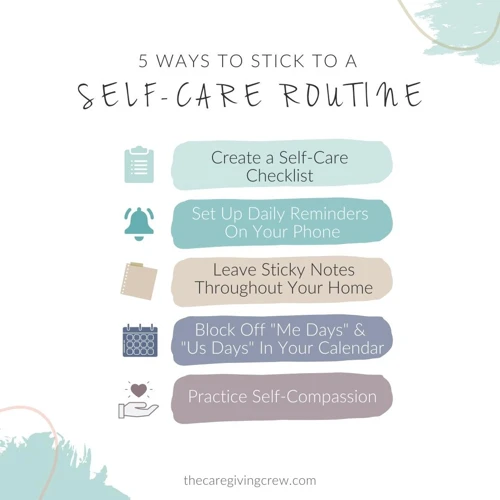
It’s time to take charge of your well-being and develop a self-care routine that works for you. While stress can often lead to unhealthy snacking habits, implementing a personalized self-care plan can help manage stress levels and promote healthier behaviors. By identifying your unique stress triggers and selecting self-care activities that resonate with you, you can establish a routine that not only combats stress-induced snacking but also enhances your overall physical and emotional health. In this section, we’ll explore the process of creating your own self-care routine and incorporating it into your daily life. So, let’s get started on this journey towards a healthier, more fulfilling lifestyle!
Identifying stress triggers
Identifying Stress Triggers
Stress triggers are the events or situations that cause stress in our lives. Identifying these triggers is an important step in creating a self-care routine to avoid stress-induced snacking. One way to identify your stress triggers is by keeping a journal.
In the journal, create an html table with the following columns:
- Trigger: Write down the event or situation that caused stress
- Emotions: Note the emotions you experienced during and after the trigger
- Coping mechanisms: Write down how you coped with the stressor
- Outcome: Note the outcome of the stressor
By recording this information, you can look for patterns and identify the triggers that cause the most stress. For example, you may find that a certain task at work consistently causes stress and leads to snacking. By identifying this trigger, you can take steps to address it and avoid snacking.
Some common stress triggers include:
- Work-related stress, such as deadlines or conflicts with colleagues
- Financial stress, such as debt or unexpected expenses
- Relationship issues, such as conflicts with family or friends
- Health problems, such as chronic pain or illness
- Life changes, such as moving, starting a new job, or a relationship ending
Once you have identified your stress triggers, you can begin to develop strategies to cope with them. This may include incorporating self-care activities into your routine, seeking support from friends or a therapist, or finding ways to reduce the impact of the stressor. By taking steps to manage your stress, you can reduce the likelihood of stress-induced snacking and improve your overall well-being.
Choosing self-care activities that work for you
When it comes to selecting self-care activities, the options can be overwhelming. It’s important to choose activities that work for you and fit into your schedule. Here are some options to consider:
- Physical activity: Exercise has been proven to reduce stress levels and boost mood. Consider trying a fitness class, going for a walk or run outside, or even doing some yoga or stretching.
- Meditation or mindfulness: These practices can help you focus on the present moment, reduce anxiety, and improve overall well-being. There are a variety of apps and online resources that offer guided meditations and mindfulness exercises.
- Creative outlets: Artistic endeavors such as painting, writing, or playing music can be therapeutic and allow you to express yourself in a positive way. You don’t have to be a professional to benefit from creative activities.
- Relaxation techniques: Practices like taking a warm bath, getting a massage, or practicing deep breathing exercises can help calm the mind and reduce stress levels.
- Social connections: Spending time with friends and loved ones can have a positive impact on mental health. Consider planning a social outing or even just having a phone call or video chat with someone you care about.
- Self-reflection: Journaling or spending time alone in reflection can help you identify and manage your stress triggers. It can also help you cultivate a greater sense of self-awareness and personal growth.
Remember, the key is to find activities that work for you and that you enjoy. Incorporating self-care into your routine can take some trial and error, so be patient with yourself and experiment with different options until you find what works best for you.
Incorporating your self-care routine into your daily life
Incorporating your self-care routine into your daily life is essential for creating long-term habits that can help manage stress and reduce the likelihood of stress-induced snacking. Here are some strategies you can use to make self-care a regular part of your routine:
| Strategy | Description |
|---|---|
| Schedule it in | Just like any other important task or appointment, schedule your self-care activities into your day. Write them down in a planner or set reminders on your phone to ensure that you don’t forget or push them aside. |
| Start small | It can be overwhelming to try to incorporate too many new habits at once. Start with one or two self-care activities and gradually add more over time as you build your routine. |
| Make it enjoyable | Self-care activities shouldn’t feel like a chore. Choose activities that you genuinely enjoy and look forward to doing, whether it’s taking a relaxing bath or going for a walk in nature. |
| Be flexible | Life can be unpredictable, and sometimes our schedules don’t go according to plan. If you miss a self-care activity, don’t fret — simply reschedule it for another time or find a way to incorporate it into another part of your day. |
| Get support | Ask friends or family members to join you in your self-care activities, or find a support group where you can connect with others who are also working on developing self-care habits. |
By incorporating these strategies into your self-care routine, you’ll be more likely to stick with it and reap the benefits of reduced stress and improved eating habits. Remember to be patient with yourself and celebrate each small step toward building a healthier lifestyle.
Additional Tips for Combating Stress-Induced Snacking
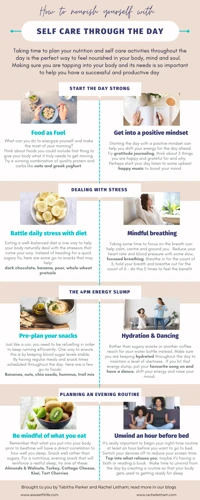
When stress hits, it’s easy to reach for a bag of chips or a candy bar to provide temporary relief. Unfortunately, indulging in stress-induced snacking can lead to unwanted weight gain and unhealthy eating habits. But don’t worry, there are ways to combat this. In addition to incorporating self-care techniques into your routine, there are several other methods to help manage stress and avoid snacking. Let’s take a look at some effective tips for combating stress-induced snacking.
Stress-reducing foods
Stress-reducing foods are a great addition to any self-care routine aimed at managing stress-induced snacking. Incorporating these foods into your diet can help you feel more relaxed and calm, reducing the likelihood of reaching for unhealthy snacks. Below are some examples of stress-reducing foods, along with their benefits:
| Food | Benefits |
|---|---|
| Avocado | Rich in healthy fats that can reduce inflammation and lower cortisol levels |
| Blueberries | High in antioxidants that combat stress and inflammation |
| Almonds | Contain healthy fats, fiber, and magnesium, which can reduce stress and lower blood pressure |
| Salmon | High in omega-3 fatty acids, which can reduce inflammation and lower cortisol levels |
| Dark chocolate | Contains antioxidants and can boost mood and reduce feelings of stress |
| Greek yogurt | High in protein, which can boost mood and reduce anxiety |
Adding these stress-reducing foods to your diet can have a positive impact on your stress levels and overall well-being. In addition to incorporating these foods, it’s important to pay attention to portion sizes and maintain a balanced diet. It’s important to remember that food is just one aspect of managing stress and self-care, and it’s important to also focus on other stress-relieving activities such as exercise and mindfulness techniques.
Exercise and physical activity
Regular exercise and physical activity are important components of any self-care routine for managing stress and avoiding stress-induced snacking. Physical activity has been shown to reduce stress levels by releasing endorphins, which are natural chemicals in the body that promote feelings of happiness and well-being.
Here are some ways to incorporate exercise and physical activity into your self-care routine:
| Activity | Description |
|---|---|
| Cardiovascular exercise | Activities such as running, cycling, or swimming that get your heart rate up and increase oxygen flow to the brain. |
| Strength training | Activities such as weightlifting or bodyweight exercises that build muscle mass and help reduce cortisol levels. |
| Yoga or stretching | Activities such as yoga, stretching, or Pilates that promote relaxation, reduce tension, and improve flexibility. |
| Daily movement | Small activities such as walking, taking the stairs, or doing household chores that can add up to significant amounts of physical activity throughout the day. |
It’s important to find activities that you enjoy and that fit into your lifestyle so that you’re more likely to stick with them. Incorporating physical activity into your daily routine can also be helpful, such as taking a walk during your lunch break or doing a short workout before or after work.
Remember, exercise and physical activity are just one aspect of a comprehensive self-care routine for managing stress and preventing stress-induced snacking. Be sure to also incorporate relaxation techniques, mindful eating practices, and other stress-reducing activities that work for you.
Mindful eating techniques
When it comes to combating stress-induced snacking, mindful eating techniques can be incredibly helpful. Here are some strategies to try:
- Focus on your food: Instead of eating while distracted by the TV or your phone, make an effort to focus solely on your food. Pay attention to its taste, texture, and aroma.
- Chew thoroughly: Taking the time to chew your food slowly and thoroughly not only helps with digestion, but also allows you to savor each bite and makes you more aware of how full you are.
- Use all your senses: In addition to paying attention to the taste of your food, try noticing its appearance and scent as well. This can help you feel more present and grounded during meals.
- Pause between bites: Taking a break between each bite can help you better tune in to your body’s hunger and fullness signals.
- Avoid distractions: Eating while watching TV or scrolling through your phone can make it harder to notice when you’re full, leading you to eat more than you need.
- Practice gratitude: Take a moment before eating to express gratitude for your meal and the effort that went into preparing it.
- Listen to your body: Tune in to your body’s signals of hunger and fullness. Stop eating when you feel comfortably full, even if there’s food left on your plate.
By incorporating these mindful eating techniques into your routine, you can cultivate a deeper awareness of your body’s needs and develop a healthier relationship with food.
Putting It All Together
After reading the article, you should have a detailed understanding of how to create a self-care routine to avoid stress-induced snacking. Self-care is not a one-size-fits-all approach and it may take some time and experimentation to find what works best for you. Here are some key takeaways to help you put everything together:
Step 1: Identify your stress triggers. Make a list of the things that tend to cause stress in your life. This could be work-related issues, family problems, financial struggles, or other personal challenges.
Step 2: Choose self-care activities that work for you. Based on the stress triggers you identified, select self-care activities that help you relax and manage stress. This could include reading a book, taking a relaxing bath, going for a walk in nature, or listening to calming music.
Step 3: Incorporate your self-care routine into your daily life. Make self-care a priority in your daily routine. Schedule time for self-care activities, just as you would for any other important task. This will help ensure that you make time for self-care even when you are busy or stressed.
Step 4: Utilize stress-reducing foods, exercise and physical activity, and mindful eating techniques. These additional tips will help complement your self-care routine and further avoid stress-induced snacking.
Remember, the goal is not to eliminate stress from your life entirely but to manage it in healthy ways. By taking steps to care for yourself, you can avoid stress-induced snacking and ultimately improve your overall health and wellbeing.
Conclusion
In conclusion, developing a self-care routine is essential for managing stress-induced snacking and maintaining healthy eating habits. By understanding the difference between stress-eating and hunger, we can better identify the triggers and choose appropriate self-care activities. Incorporating stress-reducing foods, exercise, and mindful eating techniques can also aid in reducing stress levels and decreasing the urge to snack.
Self-care is not a one-size-fits-all solution, and it’s important to find activities that work best for each individual. Whether it’s a bubble bath, yoga session, or simply taking a few minutes to breathe deeply and meditate, self-care should be a priority in everyday life. By regularly practicing self-care activities and making them a habit, we can improve our overall physical, emotional, and mental well-being.
Remember, managing stress and avoiding stress-induced snacking is not about perfection, but progress. It’s important to be kind to ourselves and acknowledge that setbacks may happen. Don’t let one slip-up derail your progress; instead, use it as a learning opportunity and continue to prioritize self-care.
Incorporating these tips and strategies into your daily routine can help you become more mindful about your eating habits and reduce your overall stress levels. By taking care of yourself both physically and mentally, you can lead a happier, healthier life. Remember to always prioritize self-care and make it a habit, and you’ll be setting yourself up for success.
Frequently Asked Questions
What are some common stress triggers?
Common stress triggers can include work deadlines, relationship issues, financial troubles, health concerns, and major life changes.
What are some self-care activities that can help manage stress?
Self-care activities that can help manage stress include exercise, meditation, yoga, reading, taking a bath, spending time in nature, and engaging in hobbies.
Can self-care really make a difference in managing stress?
Yes, self-care can make a significant difference in managing stress by helping to reduce tension, promote relaxation, and improve overall well-being.
How can I incorporate self-care into my daily routine?
You can incorporate self-care into your daily routine by scheduling time for self-care activities, such as setting aside 30 minutes each morning for meditation or taking a daily walk after work.
What are some examples of stress-reducing foods?
Stress-reducing foods include dark chocolate, nuts, berries, leafy greens, salmon, and chamomile tea.
Can exercise really help reduce stress?
Yes, exercise can help reduce stress by releasing endorphins and reducing levels of stress hormones like cortisol.
What are some mindful eating techniques?
Mindful eating techniques include eating slowly and savoring each bite, paying attention to hunger and fullness cues, and avoiding distractions like phones or TV during meals.
What is the difference between stress-eating and hunger?
The difference between stress-eating and hunger is that stress-eating is often triggered by emotional stress rather than physical hunger and tends to be accompanied by cravings for specific foods.
Can self-care help with weight loss?
Yes, self-care can help with weight loss by promoting healthy habits like regular exercise and mindful eating and reducing stress, which can lead to less stress-induced snacking.
Why is it important to identify stress triggers?
It’s important to identify stress triggers because it can help you develop a plan to effectively manage and reduce stress, which can in turn help reduce stress-induced snacking.

